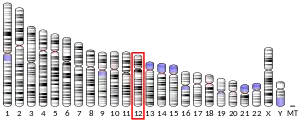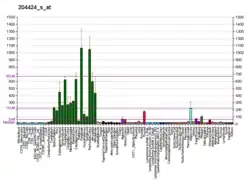LMO3
LIM domain only protein 3 is a transcription co-factor, which in humans is encoded by the LMO3 gene.[3][4][5] LMO3 interacts with the tumor suppressor p53 and regulates its function.[6] LMO3 is considered to be an oncogene in Neuroblastoma.[7]
References
- GRCh38: Ensembl release 89: ENSG00000048540 - Ensembl, May 2017
- "Human PubMed Reference:". National Center for Biotechnology Information, U.S. National Library of Medicine.
- Larsen S, Yokochi T, Isogai E, Nakamura Y, Ozaki T, Nakagawara A (February 2010). "LMO3 interacts with p53 and inhibits its transcriptional activity". Biochemical and Biophysical Research Communications. 392 (3): 252–7. doi:10.1016/j.bbrc.2009.12.010. PMID 19995558.
- Shi J, Cai W, Chen X, Ying K, Zhang K, Xie Y (August 2001). "Identification of dopamine responsive mRNAs in glial cells by suppression subtractive hybridization". Brain Research. 910 (1–2): 29–37. doi:10.1016/S0006-8993(01)02393-9. PMID 11489251. S2CID 43814085.
- EntrezGene 55885
- Larsen S, Yokochi T, Isogai E, Nakamura Y, Ozaki T, Nakagawara A (February 2010). "LMO3 interacts with p53 and inhibits its transcriptional activity". Biochemical and Biophysical Research Communications. 392 (3): 252–7. doi:10.1016/j.bbrc.2009.12.010. PMID 19995558.
- Larsen S, Yokochi T, Isogai E, Nakamura Y, Ozaki T, Nakagawara A (February 2010). "LMO3 interacts with p53 and inhibits its transcriptional activity". Biochemical and Biophysical Research Communications. 392 (3): 252–7. doi:10.1016/j.bbrc.2009.12.010. PMID 19995558.
Further reading
- Friedel S, Saar K, Sauer S, Dempfle A, Walitza S, Renner T, Romanos M, Freitag C, et al. (October 2007). "Association and linkage of allelic variants of the dopamine transporter gene in ADHD". Molecular Psychiatry. 12 (10): 923–33. doi:10.1038/sj.mp.4001986. PMID 17579611.
- Davis C, Levitan RD, Kaplan AS, Carter J, Reid C, Curtis C, Patte K, Kennedy JL (October 2007). "Dopamine transporter gene (DAT1) associated with appetite suppression to methylphenidate in a case-control study of binge eating disorder". Neuropsychopharmacology. 32 (10): 2199–206. doi:10.1038/sj.npp.1301348. PMID 17314918.
- Lim J, Hao T, Shaw C, Patel AJ, Szabó G, Rual JF, Fisk CJ, Li N, et al. (May 2006). "A protein-protein interaction network for human inherited ataxias and disorders of Purkinje cell degeneration". Cell. 125 (4): 801–14. doi:10.1016/j.cell.2006.03.032. PMID 16713569. S2CID 13709685.
- Rual JF, Venkatesan K, Hao T, Hirozane-Kishikawa T, Dricot A, Li N, Berriz GF, Gibbons FD, et al. (October 2005). "Towards a proteome-scale map of the human protein-protein interaction network". Nature. 437 (7062): 1173–8. doi:10.1038/nature04209. PMID 16189514. S2CID 4427026.
- Aoyama M, Ozaki T, Inuzuka H, Tomotsune D, Hirato J, Okamoto Y, Tokita H, Ohira M, et al. (June 2005). "LMO3 interacts with neuronal transcription factor, HEN2, and acts as an oncogene in neuroblastoma". Cancer Research. 65 (11): 4587–97. doi:10.1158/0008-5472.CAN-04-4630. PMID 15930276.
- Foroni L, Boehm T, White L, Forster A, Sherrington P, Liao XB, Brannan CI, Jenkins NA, et al. (August 1992). "The rhombotin gene family encode related LIM-domain proteins whose differing expression suggests multiple roles in mouse development". Journal of Molecular Biology. 226 (3): 747–61. doi:10.1016/0022-2836(92)90630-3. PMID 1507224.
This article is issued from Wikipedia. The text is licensed under Creative Commons - Attribution - Sharealike. Additional terms may apply for the media files.


